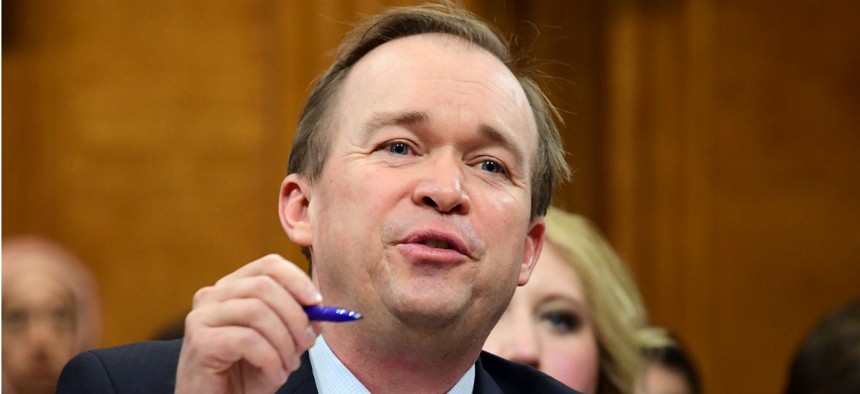
OMB nominee Mick Mulvaney testifies before the Senate Budget Committee. Ron Sachs / CNP /MediaPunch/IPX
OMB Nominee Wants “High-Morale, High-Performance” Federal Workforce
Rep. Mick Mulvaney said he wants to figure out how to better reward top employees and deal with poor performers.
President Trump’s nominee to lead the Office of Management and Budget said on Tuesday he wants a “high-morale, high-performance” federal workforce, and that he plans to look for ways to better reward top employees and hold poor performers accountable.
“I think the federal government probably could do better in dealing with employees who are exemplary, and better in dealing with employees who fall below our expectations,” said Rep. Mick Mulvaney, R-S.C., during his confirmation hearing, in response to questions from Virginia Democratic Sen. Mark Warner. “And, all I can say is I look forward to figuring out a way to solve both ends of the problem.” Mulvaney’s testimony came during his first confirmation hearing of the day before the Senate Budget Committee. In the afternoon, he testified before the Senate Homeland Security and Governmental Affairs Committee.
The high-morale, high-performance comment came in response to a direct question from Sen. Tim Kaine, D-Va. “Do you want a high-morale, high-performance workforce, or a low-morale, low-performance workforce?” Kaine asked. “High-morale, high-performance,” Mulvaney responded.
Kaine and Warner quizzed Mulvaney on his views of the federal workforce, and what effect he thought the new hiring freeze would have on morale and delivering services, including Social Security checks and veterans’ benefits. Mulvaney, who if confirmed as OMB director would have 90 days to help devise a long-term plan to reduce the size of the federal government through attrition, said he was “not familiar” with the details of the hiring freeze. Kaine said he worried a hiring freeze “would make it harder for citizens to get the services they need,” asking the OMB nominee whether he was “wrong” to be concerned.
“I don’t think you are wrong to be concerned about it, senator, [but] I don’t think it automatically follows that hiring more people will create more efficiency,” said Mulvaney.
The freeze, announced on Monday, applies governmentwide across agencies, and to any positions vacant as of Jan. 22. It would bar agencies from creating new positions. Agency heads can exempt positions deemed “necessary to meet national security or public safety responsibilities.”
Mulvaney, a vocal supporter of reining in government spending and cutting the deficit, introduced legislation in 2011 to cut the federal workforce through attrition. He estimated the bill, which called for hiring one federal employee to replace every three workers who retire or leave their job, would save $139 billion over a decade. It’s possible as OMB director he will propose a similar plan.
Warner and Kaine cited federal statistics that showed the federal civilian workforce is actually smaller now than it was under President Reagan, which Mulvaney said he was not aware of. As of December 2016, it was at 2.8 million employees; during the Reagan administration, it was around 3.2 million workers. The percent of federal government workers that make up the overall civilian workforce also is smaller today than it was 70 years ago – roughly 2 percent compared to about 7 percent then.
On Monday, White House Press Secretary Sean Spicer discussed the hiring freeze order during his press briefing, and said it “counters [the] dramatic expansion of the federal workforce in recent years.” The federal workforce has ebbed and flowed between approximately 2.7 million and 2.9 million workers since April 2010, according to the Bureau of Labor Statistics.
Kaine also brought up Trump’s Contract with the American Voter, a blueprint of Trump’s first 100 days in office that then-GOP presidential nominee unveiled last fall. Implementing a federal hiring freeze was listed along with five other measures designed to “clean up the corruption and special interest collusion in Washington, D.C.” Kaine asked why the administration is “pitching the false view that federal workers are corrupt or beholden to special interests.” Mulvaney said he wasn’t familiar with the statement and was not comfortable commenting on it, but later added, “I don’t think there is an assumption that is hard-wired into any system that federal workers are corrupt.”
Mulvaney faced questions from other lawmakers regarding his views on the debt ceiling, entitlement reform, regulatory reform and reducing improper payments in government. The congressman in 2015 successfully shepherded into law the Federal Improper Payments Coordination Act, designed to use modern data analytics to better deal with improper payments and eliminate waste, fraud and abuse in federal agencies. “OMB can really require these agencies to do a better job,” Mulvaney said, adding that some agencies, like the Social Security Administration, already a good job of preventing and eliminating waste and fraud.
The OMB nominee, whom Maryland Democratic Sen. Chris Van Hollen called a “straight-shooter,” vowed to present the facts to the president, Congress, and the public, if confirmed.
“I recognize that good public service – whether in a state legislature, Congress, or OMB – takes both courage and wisdom,” Mulvaney said in his opening statement. “The courage to lead, and the wisdom to listen. I have learned that I do not have a monopoly on good ideas. Facts – and the cogent arguments of others – matter. I will be loyal to the facts, and to the American people whom I serve.”







